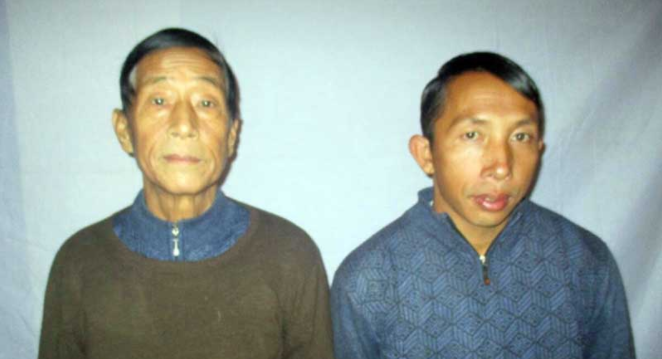Charges have been filed against two Kachin pastors detained by the military sometime after they were last seen on Christmas Eve, with their whereabouts kept secret for weeks.
Langjaw Gam Seng, 35, and Dumdaw Nawng Lat, 65, were last seen en route to Byuha Gon military base in northern Shan State’s Muse Township after being summoned by telephone by an unidentified caller.
Presidential spokesperson Zaw Htay told DVB the men have been charged under the colonial-era Unlawful Associations Act.
“According to the military, now they are in the hands of the Muse Police Station and have been charged under the Unlawful Associations Act,” he said, adding that the government would oversee the appointment of the defendants’ legal representation.
Zaw Htay was speaking to DVB on Tuesday, after two international rights groups earlier in the day called on the Burma Army to “immediately release or appropriately charge” the two Kachin faith leaders in custody.
In early December the men, who are both Baptist pastors, assisted a journalist inspecting a Catholic church that was damaged by military airstrikes in the Shan State border town of Mongko. Their subsequent abduction was widely considered to be an act of reprisal by the military.
Since November, government forces have been locked in conflict with a coalition of ethnic armed groups calling themselves the “Northern Alliance.”
The government had originally denied the men were in military custody. On 10 January, Zaw Htay told UCANews, “According to our ground report, they were taken by the Kachin Independence Army, not the military.”
The KIA is a member of the Northern Alliance.
Only nine days later, following a surge in media coverage of the case, the state-run daily Global New Light of Myanmar announced that the men had been arrested “under suspicion of recruiting, [and] spying for armed insurgents.”
Zaw Htay told DVB that the President’s Office was unaware of the true nature of the men’s disappearance until the military made its announcement last week. The Union government was “monitoring the situation,” he added.
Phil Robertson, the deputy director of Human Rights Watch’s Asia bureau, said the unlawful association charge was “not surprising.”
“We think the Unlawful Associations Act should be either revoked or brought into line with international human rights standards.”
For years, the legislation has been used to imprison those accused of having ties to the country’s myriad ethnic armed groups.
“We believe defendants should be able to select their own [legal] counsel,” Robertson said. “If they decide that they want to avail themselves of some government-appointed lawyer that is their right, however, as representatives of the Kachin Baptist Convention I would be surprised if they can’t find the own lawyers.”
Robertson voiced concern that the President’s Office spokesperson had been quick to deny military involvement earlier this month.
“If he [Zaw Htay] didn’t know where they were until that statement was released by the military, his answer should have been, ‘I don’t know where they are. We are concerned as well.’ But instead to blame the KIA without evidence is shameful,” he said.
In its joint statement on Tuesday, Human Rights Watch and Fortify Rights said the military had been pressured into revealing the truth.
“The arrest of the two Kachin Baptist leaders appears to be retaliation for their help in exposing wartime abuses. The military came clean about their detention only after local and international outcry, but they are still at grave risk,” said Matthew Smith, chief executive officer of Fortify Rights.
In a statement released on Thursday, the military alleged that Dumdaw Nawng Lat acted as a “financial supporter, informer, recruiter, [and] rumor monger” for the KIA, the most powerful armed group in the Northern Alliance. No evidence supporting allegations against either of the men has yet emerged.
[related]
Attempts by DVB to speak with military representatives were unsuccessful at the time of publication.
In their statement, HRW and Fortify Rights urged the military to act in accordance with international standards.
“The Burmese military’s handling of this case shows how far the army needs to go to bring the government in line with international human rights standards. The dangers to civilians and those who are helping to expose abuses in conflict areas seem as great as ever — strong action is needed to bring changes fast,” said Robertson.
On Friday, the United Nations human rights rapporteur for Burma registered her serious concerns for those living in the conflict-torn Kachin and northern Shan State region.
“It is evident that the situation in Kachin and at the northern borders is deteriorating. Those in Kachin State tell me that the conditions have deteriorated — that the situation is now worse than at any point in the past few years,” she said.



